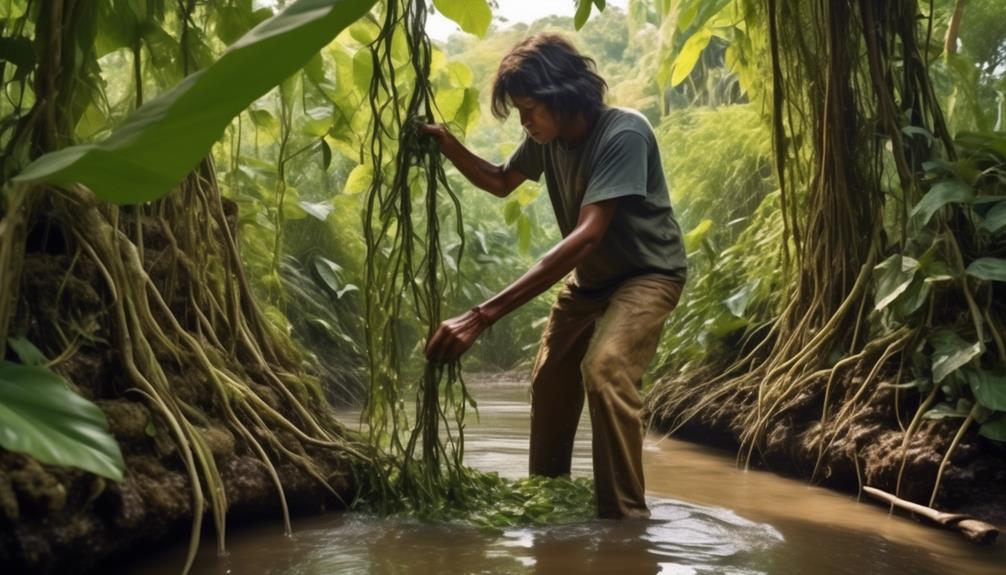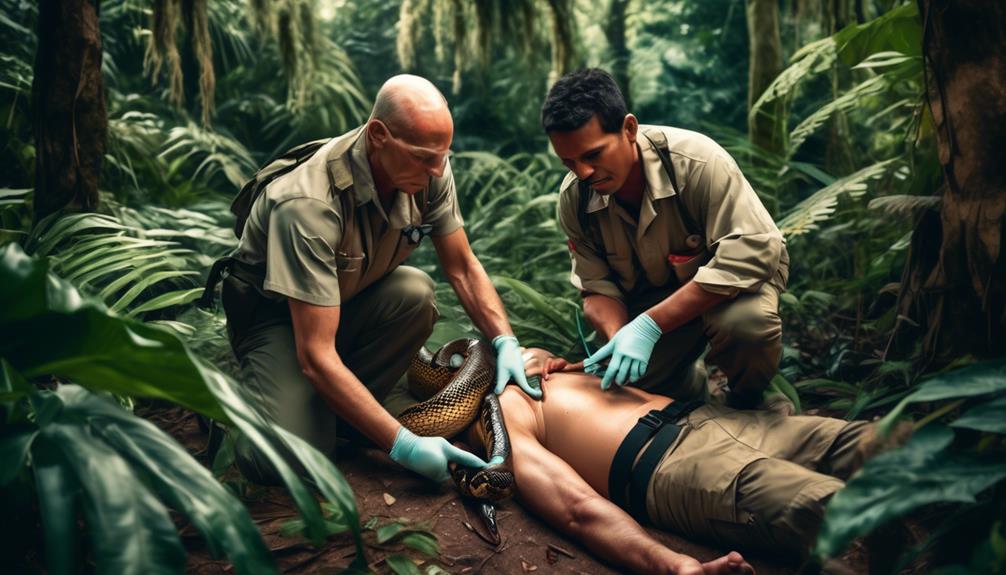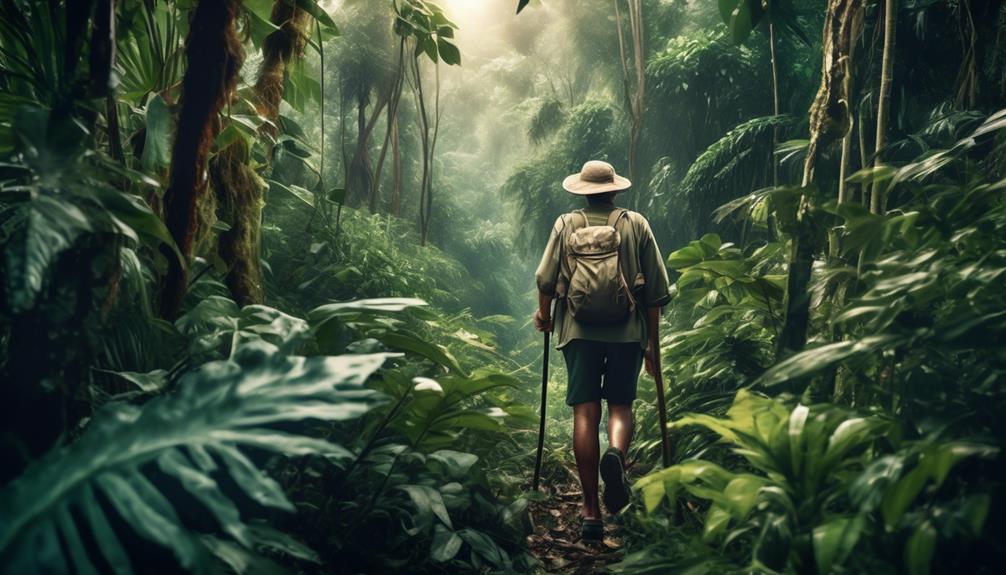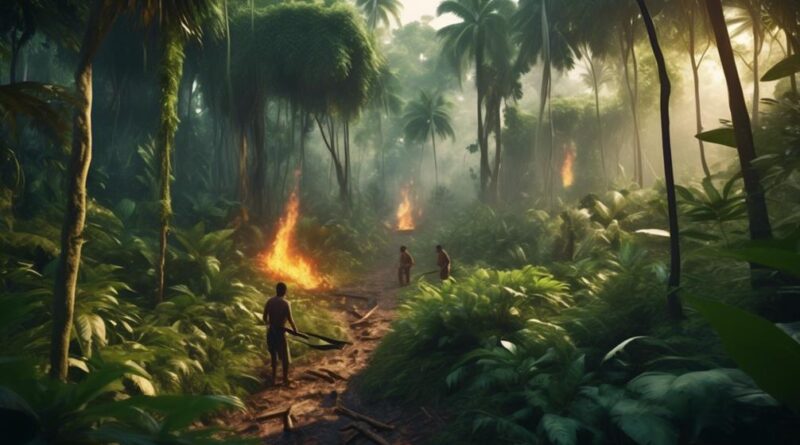Survival Guide: Essential Skills for Jungle Expeditions
You never know when you might find yourself in a challenging jungle environment, where survival skills become crucial.
From navigating dense vegetation to finding safe water sources and identifying edible plants, the jungle presents a unique set of challenges.
As you prepare for your next expedition, it's essential to equip yourself with the knowledge and skills necessary to thrive in this unforgiving environment.
Let's explore the essential skills and strategies that will help you not just survive, but truly thrive in the jungle.
Understanding Jungle Navigation
To navigate the jungle successfully, you must rely on your senses and familiarize yourself with natural landmarks. Understanding jungle navigation is crucial for your expedition.
Compass navigation and celestial navigation are fundamental skills for orienting yourself in the dense jungle. Your compass will guide you in a specific direction, while celestial navigation, using the sun or stars, can provide valuable directional cues, especially when the canopy obstructs your view of the sky.
Map reading is another essential skill. Study the topography of the area and identify prominent features that can serve as reference points. Understanding contour lines and elevation on a map will help you anticipate changes in terrain and plan your route effectively. Additionally, using GPS can provide precise coordinates and assist in tracking your progress. However, it's crucial to have a backup plan in case of technology failure, so don't solely rely on GPS.
When navigating the jungle, be aware of the surrounding natural landmarks. Memorize distinctive trees, rocks, or rivers that can guide you through the terrain. Pay attention to the sounds and smells around you, as they can also provide important clues about your location.
Building Shelter and Fire
Navigating the jungle successfully relies on your senses and familiarization with natural landmarks.
When it comes to building shelter and fire in the jungle, your survival will depend on your ability to adapt and utilize the resources available to you. Shelter construction is crucial for protection from the elements and wildlife. Look for sturdy trees with large, overhanging branches or fallen logs to create a base for your shelter. Use large leaves, vines, and branches to construct a roof, ensuring it's sloped to allow rainwater to run off. Your shelter should be elevated to avoid ground-dwelling creatures and potential flooding during heavy rains.
In the jungle environment, fire starting is essential for warmth, cooking, and signaling for help. Look for dry materials such as dead leaves, tree bark, or small twigs to ignite your fire. Friction-based methods like the bow drill or fire plow can be effective, but it's crucial to practice these techniques beforehand. Additionally, packing a reliable fire starter like waterproof matches or a magnesium fire starter is highly recommended. Always clear the area around your fire site to prevent the spread of flames and keep it small to conserve resources.
Mastering survival skills in the jungle environment requires patience, resourcefulness, and the ability to adapt to the ever-changing conditions. By honing your shelter construction and fire starting abilities, you enhance your chances of survival in this challenging environment.
Finding Safe Water Sources

When exploring the jungle, it's vital to locate safe water sources for hydration and survival. In the wilderness, water may be contaminated with harmful bacteria, viruses, and parasites, posing serious health risks. To ensure safe drinking water, mastering purifying techniques and understanding water filtration systems are essential skills for jungle expeditions.
Purifying techniques such as boiling, chemical treatment, and using ultraviolet (UV) light can effectively eliminate harmful microorganisms from water. Boiling water for at least three minutes at a rolling boil is a reliable method to kill pathogens. Chemical treatments using chlorine dioxide or iodine tablets are convenient for on-the-go purification. Additionally, UV light purifiers are compact and efficient for destroying bacteria and viruses. These techniques are crucial for making water safe to drink in the absence of filtration systems.
Water filtration systems are valuable tools for obtaining safe drinking water in the jungle. Portable water filters equipped with microfiltration or ultrafiltration membranes can effectively remove bacteria, protozoa, and sediment from untreated water sources. Some advanced filters also integrate activated carbon to reduce odors and improve taste. Investing in a quality water filtration system can significantly reduce the risk of waterborne illnesses during jungle expeditions.
Mastering purifying techniques and understanding water filtration systems are indispensable for ensuring access to safe water sources in the jungle. By acquiring these skills, you can minimize the health hazards associated with drinking untreated water and enhance your chances of survival during expeditions.
Identifying Edible Plants and Insects
You can improve your jungle expedition survival skills by learning to identify edible plants and insects. Mastering foraging techniques and plant recognition will significantly increase your chances of finding sustenance in the wild. Here are a few essential tips to help you identify edible plants and insects:
- Foraging Techniques: When foraging for edible plants, look for familiar species such as wild berries, dandelions, and cattails. Learn to identify common edible plants in the region before your expedition. Be cautious as some edible plants may have poisonous look-alikes. Always remember the forager's rule: if in doubt, don't eat it.
- Plant Recognition: Study the local flora and learn to identify edible plants by their distinctive features. Look for guidebooks or join a local expert-led plant recognition walk to familiarize yourself with the diverse plant species in the jungle. Recognizing edible plants can be a life-saving skill in a survival situation.
- Insect Consumption: Insects can be an excellent source of protein and other essential nutrients. Research which insects are safe to consume in the jungle, such as ants, grasshoppers, and beetle larvae. Understanding the nutritional value of insects and knowing how to collect, prepare, and consume them can provide valuable sustenance in the wild.
- Nutritional Value: Educate yourself about the nutritional value of edible plants and insects. Knowing which plants provide essential vitamins and minerals, and which insects offer high protein content can be crucial for maintaining your energy levels during a jungle expedition.
First Aid for Jungle Emergencies

Mastering first aid for jungle emergencies is crucial for ensuring your safety and well-being, especially when navigating the wilderness and encountering potential hazards. In the jungle, being prepared to provide first aid in emergency situations can make the difference between life and death. Survival medicine in the jungle requires a specific set of skills due to the unique challenges posed by the environment. When it comes to jungle first aid, it's essential to be ready to respond to a variety of wilderness injuries and medical emergencies.
In the jungle, the risk of encountering venomous snakes, insects, and other potentially harmful creatures is ever-present. Therefore, knowing how to conduct emergency response procedures for snakebites, insect stings, and animal attacks is crucial. Additionally, being able to recognize and treat common jungle-related ailments such as heatstroke, dehydration, and fungal infections is essential for your well-being in the wilderness.
Furthermore, understanding how to create basic splints, dressings, and bandages from natural resources found in the jungle can be invaluable in treating fractures, cuts, and wounds. It's also important to be familiar with identifying and using natural remedies and plants with medicinal properties that can aid in treating injuries and illnesses in a jungle environment.
Creating Jungle Tools and Weapons
To survive in the jungle, it's essential to know how to craft essential tools and weapons using natural resources. Here are four crucial skills for creating jungle tools and weapons:
- Improvising weaponry: When in the jungle, you may need to improvise weapons for hunting or self-defense. Look for sturdy branches that can be fashioned into spears or sharpened into primitive arrows. Additionally, rocks can be used to create crude but effective throwing weapons. Understanding how to fashion these basic weapons from natural materials can greatly improve your chances of survival.
- Crafting tools: Crafting tools from jungle resources is essential for various tasks such as building shelters, preparing food, and making fire. Learn to fashion knives and axes from sharp stones or hard wood to help with cutting and carving. Additionally, creating digging sticks or small shovels can aid in digging up edible roots or creating simple traps for catching small game.
- Constructing traps: Knowing how to construct traps using natural materials can greatly increase your chances of catching food. Simple traps such as deadfalls or snares can be made using vines, branches, and rocks. Understanding the principles behind trap construction and placement is vital for successful hunting in the jungle.
- Maintaining and repairing: Once you have crafted tools and weapons, it's important to know how to maintain and repair them. Regular sharpening, reinforcing, and adjusting of tools and weapons will ensure their longevity and effectiveness in the challenging jungle environment.
Wildlife Awareness and Safety

While exploring the jungle, it's crucial to remain vigilant and knowledgeable about the wildlife to ensure your safety. Wildlife observation is essential for identifying potential threats and understanding the behavior of animals in their natural habitat. Always maintain a safe distance when observing wild animals, as they may perceive you as a threat if you get too close. Additionally, it's important to be aware of predator avoidance techniques. Research and understand the specific predators that inhabit the jungle you're exploring and learn how to minimize the risk of encountering them. This knowledge can be crucial in avoiding dangerous confrontations.
In the event of animal encounters, it's vital to remain calm and avoid sudden movements. Sudden movements can trigger defensive behaviors in animals, leading to potential attacks. If confronted by a predator, slowly back away while maintaining eye contact and making yourself appear larger.
It's also important to have emergency protocols in place. Always carry a whistle or other signaling device to alert others in the event of an emergency. Familiarize yourself with the local emergency services and communication methods. Additionally, be prepared with basic first aid knowledge and supplies to address any wildlife-related injuries.
Mental Preparedness for Isolation
Maintaining awareness of wildlife and developing predator avoidance techniques can help you mentally prepare for the isolation of the jungle, ensuring your safety and well-being. Coping strategies, psychological challenges, self-care practices, and mental resilience are crucial for navigating the mental rigors of isolation in the jungle.
Here's what you need to keep in mind:
- Coping Strategies: It's essential to have coping strategies in place to deal with the psychological challenges of isolation. Engage in activities that bring you joy and comfort, such as journaling, meditation, or practicing mindfulness. These activities can help alleviate feelings of loneliness and anxiety, keeping your mind focused and resilient.
- Psychological Challenges: Isolation can present various psychological challenges, including feelings of loneliness, helplessness, and even mild depression. Recognizing these challenges and actively working to address them through positive self-talk and mindfulness can help you maintain a healthy mindset.
- Self-Care Practices: Engage in daily self-care practices to nurture your mental resilience. This may include maintaining a routine, getting enough rest, and ensuring proper nutrition. Taking care of your physical well-being can significantly impact your mental state, helping you stay strong and focused during isolation.
- Building Mental Resilience: Strengthen your mental resilience by staying positive and focused on your goals. Visualization techniques and setting achievable milestones can help you stay motivated, even during the most challenging times of isolation.
Frequently Asked Questions
How Can I Prepare for Encounters With Dangerous Animals Like Snakes and Big Cats in the Jungle?
To prepare for encounters with dangerous animals like snakes and big cats in the jungle, study survival tactics and animal behavior. Learn snake handling and big cat deterrents. Always stay alert and be ready to react calmly.
What Are Some Lesser-Known Edible Plants and Insects That Can Be Found in the Jungle?
When foraging in the jungle, identifying edible plants and jungle insects is crucial for survival. Some lesser-known edible plants include the malabar spinach and the chaya plant. Additionally, termites and palm weevils are good sources of protein.
Are There Any Specific Mental Exercises or Practices That Can Help With Isolation and Loneliness in the Jungle?
To build mental resilience in the jungle, practice mindfulness and meditation. Keep a journal to express your thoughts and emotions. Seek comfort in nature and maintain social support through regular communication with your team or loved ones.
How Can I Signal for Help or Communicate With Potential Rescuers if I Become Lost or Injured in the Jungle?
If you're lost or injured in the jungle, signaling techniques like creating smoke, using a mirror, or building a signal fire can attract rescuers. Also, employing whistle blasts, three signals, or SOS with a flashlight can help communicate with potential rescuers.
What Should I Do if I Encounter Hostile or Unfriendly Locals While Navigating Through the Jungle?
If you encounter hostile locals in the jungle, try to remain calm and avoid escalating the situation. Show respect for their customs and seek to understand their perspective. Conflict resolution and cultural understanding are key.
Conclusion
Now that you've learned these essential skills for jungle expeditions, you're better prepared to navigate, survive, and thrive in the wild.
Remember to stay calm, be resourceful, and trust your instincts.
With practice and experience, you'll become more confident and capable in jungle environments.
So, go out there and explore the beauty of the jungle, knowing that you have the skills to handle whatever challenges come your way.
Good luck and stay safe!
